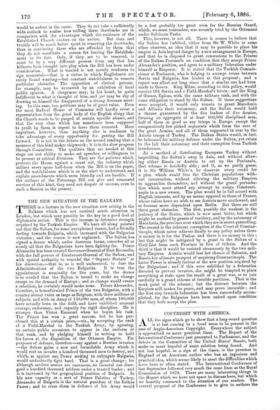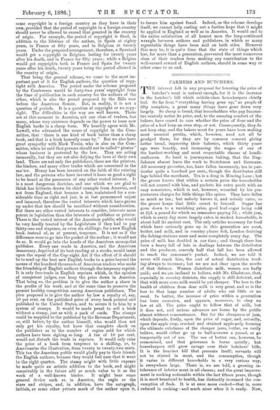COPYRIGHT WITH AMERICA. same copyright in a foreign country as
they have in their own, provided that the period of copyright in a foreign country should never be allowed to exceed that granted in the country of origin. For example, the period of copyright is fixed, in addition to the lifetime of the author, in Spain at eighty years, in France at fifty years, and in Belgium at twenty years. Under the proposed arrangement, therefore, a Spaniard would get a copyright in Belgium lasting for twenty years after his death, and in France for fifty years ; while a Belgian would get copyrights both in France and Spain for twenty years after his death, twenty years being the period allowed in the country of origin.
That being the general scheme, we come to the most im- portant part of it for English authors, the question of copy- right with America. The period under the scheme proposed by the Conference would be forty-two years' copyright from the time of publication in each country for the authors of the other, which is also the period proposed by the Bills now before the American Senate. But, in reality, it is not a question of periods. It is a question of copyright or no copy- right. The difficulties in the way are well known. There are at this moment in America, not one class of traders, but many, whose very existence depends on the power to issue new English books in a cheap form. We heartily agree with Mr. Lowell, who advocated the cause of copyright in the Com- mittee, that there is one kind of book better than a cheap book, and that is a book honestly come by." But we also have great sympathy with Mark Twain, who is also on the Com- mittee, when he said that persons should not be called " pirates" whose business is protected by the law. They are acting immorally, but they are not also defying the laws of their own land. There are not only the publishers, there are the printers, the binders, and many other trades which are concerned in the meter. Money has been invested on the faith of the existing law, and the persons who have invested it have as good a right to be heard as the possessors of any other vested interest. It is a most dangerous doctrine, and one which we are glad to think has hitherto drawn its chief example from America, and not from England, that because a law, maintained for a con- siderable time as right and just, is at fast pronounced unjust and immoral, therefore the vested interests which have grown up under that law should be sacrificed without consideration. But there are other vested interests to consider, interests more potent in legislation than the interests of publisher or printer. There is the vested interest of the American public, who would be very hardly treated by the Legislature if they had to pay thirty-one and sixpence, or even six shillings, for a new English book, instead of, as at present, tenpence. It is not as if the difference were to go into the pocket of the author ; it would not do so. It would go into the hands of the American monopolist publisher. Every one reads in America, and the American democracy, deprived of its best reading at a stroke, would insist upon the repeal of the Copyright Act if the effect of it should be to send up the best new English books to a price beyond the means of the hundred thousands of American readers who make the friendship of English authors through the tenpenny reprint. It is only free-trade in English reprints which, in the opinion of competent judges, can keep the price down in America. That being so, the problem is to give the author a share in the profits of his work, and at the same time to preserve the present healthy competition among American publishers. The plan proposed is to give the author by law a royalty of, say, 10 per cent. on the published price of every book printed and published in the United States, and to secure it to him by a system of stamps. It would be made penal to sell a book without a stamp, just as with a pack of cards. The stamps could be supplied to the publisher by the Revenue Department, or, still better, by the author himself, who would then not only get his royalty, but have that complete check on the publisher as to the number of copies sold for which authors have been sighing so long. A tax of 10 per cent. would not disturb the trade in reprints. It would only raise the price of a book from tenpence to a shilling, or, to Americanise the illustration, from twenty to twenty-two cents. This tax the American public would gladly pay to their friends the English authors, because they would feel sure that it went to the right quarter. The stamp might with little expense be made quite an artistic addition to the book, and might conceivably in the future add as much value to it as the work of a well-known binder. It might bear some general device such as, in America, the eagle or the stars and stripes, and, in addition, have the autograph, initials, or some other private mark of the author upon it,
to insure him against fraud. Indeed, as the scheme develops itself, we cannot help casting out a furtive hope that it might be applied in England as well as in America. It would end to the entire satisfaction of all honest men the long-continued wrangle between authors and publishers, in which so many regrettable things have been said on both sides. However this may be, it is quite time that the state of things which has, for more than a generation, prevented the most numerous class of their readers from making any contribution to the well-earned reward of English authors, should in some way or other come to an end.















































 Previous page
Previous page